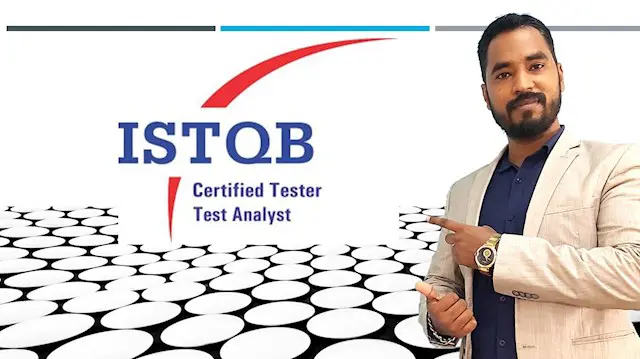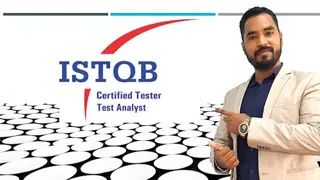
ISTQB Advanced Test Analyst Certification 2022 & Sample Questions
Gain Skills of QA Lead and Be a certified ISTQB Test Analyst
Neeraj Singh
Summary
- Reed courses certificate of completion - Free
- Tutor is available to students
Add to basket or enquire
Overview
5+ hours of Mobile Application Testing concepts/skills to prepare you and help you enhance your profile as a Test Analyst or Test Lead. Also, the course prepares you to Get certified with ISTQB Advance Test Analyst & add quality to your process and build a competitive profile.
This course covers the end-to-end syllabus discussion, Sample Questions, Tips & Tricks for exam and Time Management.
Note: This course is the only training of the certification that doesn't include the exam.
Curriculum
-
Introduction 10:49
-
Chapter 1 - The Test Analyst Tasks in The Test Process 1:03:23
-
Chapter 2 - Test Analyst's Task in Risk Based Testing 31:36
-
Chapter 3 - Test Techniques 1:43:16
-
Chapter 4 - Testing Software Quality Characteristics 57:11
-
Chapter 5 - Reviews 17:24
-
Chapter 6 - Test Tools and Automation 22:02
Course media
Description
Note: There are few topics that were removed in the new syllabus so you may observe improper order in Chapter 1 but it still covers beyond the need.
In this course, the learner will understand the following learning objective
Explain how and why the timing and level of involvement for the Test Analyst vary when working with different software development lifecycle models.
-
Summarize the appropriate tasks for the Test Analyst when conducting analysis and design activities.
-
Explain why test conditions should be understood by the stakeholders.
-
For a given project scenario, select the appropriate design level for test cases (high-level or low-level).
-
Explain the issues to be considered in the test case design.
-
Summarize the appropriate tasks for the Test Analyst when conducting test implementation activities.
-
Summarize the appropriate tasks for the Test Analyst when conducting test execution activities.
-
For a given situation, participate in risk identification, perform a risk assessment and propose appropriate risk mitigation.
-
Analyze a given specification item(s) and design test cases by applying equivalence partitioning.
-
Analyze a given specification item(s) and design test cases by applying boundary value analysis.
-
Analyze a given specification item(s) and design test cases by applying decision table testing.
-
Analyze a given specification item(s) and design test cases by applying state transition testing.
-
Explain how classification tree diagrams support test techniques.
-
Analyze a given specification item(s) and design test cases by applying pairwise testing.
-
Analyze a system, or its requirement specification, in order to determine likely types of defects to be found and select the appropriate black-box test technique(s).
-
Explain the principles of experience-based test techniques, and the benefits and drawbacks compared to black-box and defect-based test techniques.
-
Determine exploratory tests from a given scenario.
-
Describe the application of defect-based test techniques and differentiate their use from black-box test techniques.
-
For a given project situation, determine which black-box or experience-based test techniques should be applied to achieve specific goals.
-
Explain what test techniques are appropriate to test functional completeness, correctness, and appropriateness.
-
Define the typical defects to be targeted for the functional completeness, correctness, and appropriateness characteristics.
-
Define when the functional completeness, correctness, and appropriateness characteristics should be tested in the software development lifecycle.
-
Explain the approaches that would be suitable to verify and validate both the implementation of the usability requirements and the fulfillment of the user's expectations.
-
Explain the role of the test analyst in interoperability testing including identification of the defects to be targeted.
-
Explain the role of the test analyst in portability testing including identification of the defects to be targeted.
-
For a given set of requirements, determine the test conditions required to verify the functional and/or non-functional quality characteristics within the scope of the Test Analyst.
-
Identify problems in a requirements specification according to checklist information provided in the syllabus.
-
Identify problems in a user story according to checklist information provided in the syllabus.
-
For a given scenario, determine the appropriate activities for a Test Analyst in a keyword-driven automation project.
-
Explain the usage and types of test tools applied in test design, test data preparation, and test execution.
Who is this course for?
Anyone who is looking forward to work as Functional Test Lead
Anyone who is looking forward to be a Team Lead
Anyone who wants to be a better Tester (Senior Tester)
Requirements
Must be certified with ISTQB Foundation Level (Only to take up the Certification)
Knowledge about the test process and formal techniques is must
Career path
On course completion, you will be able to fulfill the criteria and knowledge required to begin/grow higher in your journey as a Test Analyst, Test Lead, or QA Lead.
Questions and answers
Currently there are no Q&As for this course. Be the first to ask a question.
Certificates
Reed courses certificate of completion
Digital certificate - Included
Will be downloadable when all lectures have been completed
Reviews
Currently there are no reviews for this course. Be the first to leave a review.
Legal information
This course is advertised on reed.co.uk by the Course Provider, whose terms and conditions apply. Purchases are made directly from the Course Provider, and as such, content and materials are supplied by the Course Provider directly. Reed is acting as agent and not reseller in relation to this course. Reed's only responsibility is to facilitate your payment for the course. It is your responsibility to review and agree to the Course Provider's terms and conditions and satisfy yourself as to the suitability of the course you intend to purchase. Reed will not have any responsibility for the content of the course and/or associated materials.


